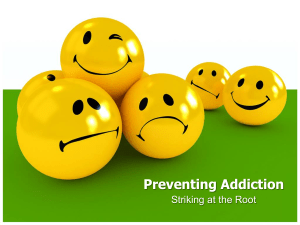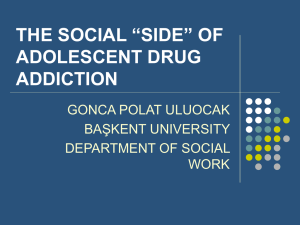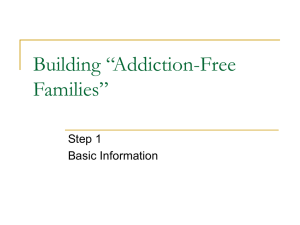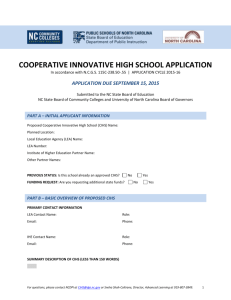Addiction Update Slides - National Council for Behavioral Health
advertisement
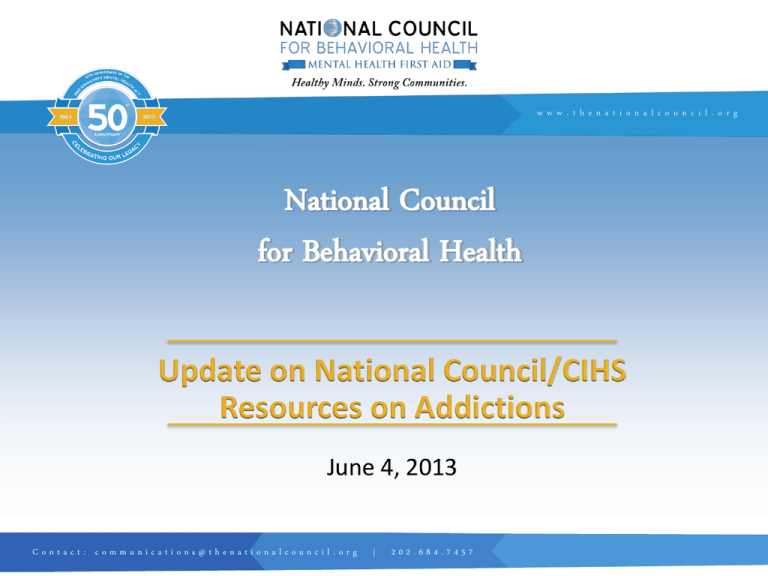
www.thenationalcouncil.org National Council for Behavioral Health Update on National Council/CIHS Resources on Addictions June 4, 2013 Contact: communications@thenationalcouncil.org | 202.684.7457 May 29th Capitol Hill Briefing Strengthening Our Communities: Ensuring Access to Effective Substance Abuse Treatment Services • The National Council, along with three of its members: Haymarket Center, Phoenix House, and WestCare Foundation, sponsored a congressional briefing on substance abuse treatment services and the need to ensure access to these services during implementation of the Affordable Care Act. • Panelists: • Jack B. Stein, Director of the Office of Science Policy and Communications at National Institute of Drug Abuse (NIDA) • Beth Arthur, Sheriff of Arlington County, Virginia • Herbert A. Cruz, Director of Telepsychiatry Services at Kings View Behavioral Health System • Randolph Muck, Founder of Advocates for Youth and Family Behavioral Health Treatment • Abby Raphael, Arlington County, Virginia Public Schools Board Member 1 Addiction Webinar • On May 22nd, the National Council sponsored an addiction webinar, Reducing Hospital Readmissions for Clients with Addictions. • The webinar focused on the SAMHSA funded mPOWER Project: • mPower provides mobile patient opportunities for wellness and recovery to veterans (18-55 years old) with a diagnosis of substance abuse and physical/psychiatric comorbidities. • Goal: reduce use of addiction crisis and emergency medical/psychiatric services, through utilization of technology-based interventions. • Loyola Recovery Foundation found a 192% decrease in readmission rates among participants after implementation. • This webinar was co-sponsored by National Opinion Research Center and the National Addiction Technology Transfer Center. 2 Addiction Newsletter • The National Council’s Addiction News Now is published monthly in partnership with Hazelden. • The newsletter features the latest addiction news, policy updates, and addiction data. The newsletter includes important resources concerning addiction, as well as reminders for upcoming webinars. 3 Co-Occurring Disorder Learning Community • Program Structure: This 13 month initiative engaged 10 member organizations (5 addiction primary, 5 mental health primary) across 10 states in a quality improvement process with the goal of establishing comprehensive integrated treatment for co-occurring MH/SU treatment. • • • • Outcomes: New training programs for employees on co-occurring disorders were implemented, which increased staffs’ comfort level with co-occurring consumers, and allowed for quality cooccurring services and coordination of care to be achieved. Participants determined there must be focus on improving clinical services, as well as monitoring behind the scenes to best support and sustain the improvement of clinical services. Assessment processes were consolidated through the use of tools to screen and assess for COD, which increased the identification of cooccurring consumers. Barriers included inability to bill by select diagnosis, which was overcome by upgrading the electronic records system. 4 MAT Health Network Learning Collaborative • • Program Structure: CIHS developed a year-long health networks learning collaborative, with the goal of increasing the adoption of medications in the treatment of individuals with substance use disorders to facilitate recovery and improved health. CIHS is working with selected Single State Authorities for substance use services to develop two health networks per the three states selected. The health networks will consist of addiction treatment programs, community health centers, and community mental health centers. • • • • Updates: CIHS has conducted numerous activities for the MAT health network participants, including meetings, webinar series, quarterly calls, website development, and a listserv. What’s Next: CIHS will continue the webinar series and provision of technical assistance. CIHS will host one-on-one meetings and site visits to focus on specific issues, while providing and connecting the health network providers to additional trainings and resources related to MAT. CIHS will also work to expand the use of strategic partners such as National Institute on Drug Abuse and National Institute on Alcohol Abuse and Alcoholism to assist with training and technical assistance. 5 Recently Released Resources • • Innovations in Addictions Treatment: Addiction Treatment Providers Working with Integrated Primary Care Services. CIHS assembled a meeting of substance abuse providers who have integrated primary care services. Innovations in Addictions Treatment compiles providers’ perspectives and insight concerning events precipitating integrations efforts, challenges encountered, lessons learned, and additional information that will help to inform integration efforts across the country. 6 Recently Released Resources • CIHS developed Primary Care for Substance Use Professionals, a free 5-hour online course for substance use professionals considering primary care opportunities. • The course provides information and resources to decide if a primary care setting is right for them. It follows four modules: • What are key aspects of primary care culture? • What new language will I need to learn? • What is my role and what difference can I make? • What does it take for an addiction professional to succeed in a primary care environment? • Collaborators: Addiction Technology Transfer Center Network and the Morehouse School of Medicine National Center for Primary Care. • Individuals can register for the course on the ATTC Network. 7 Coming Soon! • Addictions Webinar Track • CIHS Webinar Treatment Innovations: Perspectives from Addiction Providers Integrating Primary Care on June 24th from 12-1:30. • Special Webinar Series & Report: Findings of the Co-Occurring Learning Community • Re-launch of Addiction News Now 8



